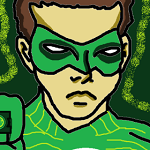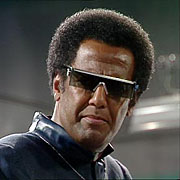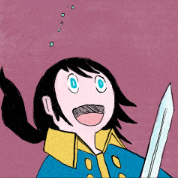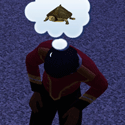|
monster on a stick posted:Because argumentum ad hominem is so much better A failure of Ethos is technically an ad-hominem, but Logos is not the only pillar of rhetoric. Tony Montana posted:Because a well informed opinion is one with influences from all sources, not just the sources you agree with. Please explain what information they will add to the formation of my opinion. I don't want to watch a 45 minute web video. I want you to summarize it for me.
|
|
|
|

|
| # ? May 2, 2024 01:07 |
|
Phylodox posted:Why? I liked the movie? Why am I going to go out of my way to have someone convince me I don't? Now all of you know how I feel whenever the Star Wars prequels are discussed. You can be a fan of a thing, be aware of its flaws, and feel that its merits outweigh them.
|
|
|
|
Tony Montana posted:Ok, but none of that applies to me. I thought the pace was silly and prevented anything actually interesting happening. I though Spock showing a complete lack of regard for his own life, then having an emotional breakdown at the (apparent) death of Kirk and pursuing Khan with lethal intent was pretty interesting stuff. Kirk & Co. blatantly violating the Prime Directive in the beginning was pretty interesting, too, and Starfleet becoming much more militaristic after Nero was also a compelling idea. I don't think the pacing interfered with any of that. Tony Montana posted:I thought the interactions of the 'comic book characters' (as RLM puts it) were simple and boring, Spock blurts out about something being illogical, Kirk just yells at everyone, what does McCoy even do besides spout dumb metaphors? The interactions between the characters, especially Scotty and Kirk this time around, and Kirk and Spock, are what made the themes of this particular movie clear. Please explain how "Kirk just yells at everyone" is even remotely true - I don't see where you're getting that from. Tony Montana posted:As said in the RLM review, why even bother with ranks in Starfleet? Obviously the mark of a true leader and hero is someone that ignores all authority and take matters into his own hands when he sees fit. This was a major part of the plot of Search for Spock, Kirk going against Starfleet and the ramifications were huge. The problem when you have such flimsy rules and ideas behind your film is that when you once again hand-wave them away to facilitate then next tit-shot, is it gets really boring because we're obviously just in magical plot land and anything goes. The idea of standing against corrupt authority has consistently been expressed across the entire Star Trek franchise. That's part of what makes this movie feel like genuine Star Trek to me. Tony Montana posted:But yeah, obviously linking a well respected source with valid critism nicely packaged for your consumption isn't what you're looking for. Again, 45-minute video. I'll probably watch it sometime. Still, I've already posted in this thread about why STID was a pleasant surprise for me, and nothing you're telling me about the RLM video makes it sound like it will change my mind.
|
|
|
|
PeterWeller posted:Please explain what information they will add to the formation of my opinion. I don't want to watch a 45 minute web video. I want you to summarize it for me. I enjoy RLM and find their videos entertaining, but I don't think it will change anyone's mind on the film. People who like it as a dumb action movie will maintain that the issues the movie has don't matter, people who dislike the movie will say the review is on-point.
|
|
|
|
The film is not dumb, as explained in the following 20-minute video: http://www.youtube.com/watch?v=-b_polwFplI
|
|
|
|
monster on a stick posted:People who like it as a dumb action movie will maintain that the issues the movie has don't matter I resent this characterization and it leads me to believe that you haven't paid attention to the arguments in support of the film. I like it as a smart, character-driven social allegory complemented by interesting space mumbo-jumbo and cool special effects and action, or in short: as a Star Trek movie.
|
|
|
|
I'd be all on board with not wanting to see this movie to boycott whitewashing, but you're not seeing the film because it might be stupid? And you still want to talk about it?
|
|
|
|
It's either a sign of how weirdly paced the movie was or how compelling the character work was that I actually noticed that every meaningful character beat was getting interrupted by an explosion of some sort.
|
|
|
|
I'm beginning to think that we're seeing two different kinds of Star Trek fan here. The first type of fan wants to see a well-built fictional universe, founded on consistent rules. The rules may be highly unrealistic compared to our world, but if they are followed consistently in the stories then that's all well and good. These are the people who can't look past plot holes and inconsistencies; they don't want to, and they shouldn't have to. The second type like Star Trek because of the society it portrays, and the morals it endorses. They liked hearing Kirk openly espouse the moral of the episode, and everyone becoming more enlightened as a result. They also like any occasion in which the crew has to struggle to decide the right action where there is no clear solution. This type of fan is absolutely willing to look past plot holes and inconsistencies, so long as the right ideals can win out. From what I can see in the thread, and among people I know IRL, the second type of fan really likes this movie, but the first type does not. Of course, there's probably lots of "types" of Star Trek fan out there - I'm just categorizing what I've seen recently.
|
|
|
|
PeterWeller posted:I resent this characterization and it leads me to believe that you haven't paid attention to the arguments in support of the film. I like it as a smart, character-driven social allegory complemented by interesting space mumbo-jumbo and cool special effects and action, or in short: as a Star Trek movie. If that is the case, then I'd say the review is worth watching since it may very well change your mind. They point out the film isn't very smart, the action set pieces were seemingly created in isolation and put together with a small script in-between, much of the space mumbo-jumbo is silly, there isn't all that much characterization, etc.
|
|
|
|
Tony Montana posted:Because a well informed opinion is one with influences from all sources, not just the sources you agree with. Well, the only source I need is me. I liked the movie. I'm not going to listen to someone whine about why they think it sucked for half the length of the movie so I can be "informed." monster on a stick posted:If that is the case, then I'd say the review is worth watching since it may very well change your mind. They point out the film isn't very smart, the action set pieces were seemingly created in isolation and put together with a small script in-between, much of the space mumbo-jumbo is silly, there isn't all that much characterization, etc. Are you saying "if you like the movie, check it this review bashing it. Perhaps you'll change your mind at hate it!" That is the most
|
|
|
|
monster on a stick posted:If that is the case, then I'd say the review is worth watching since it may very well change your mind. They point out the film isn't very smart, the action set pieces were seemingly created in isolation and put together with a small script in-between, much of the space mumbo-jumbo is silly, there isn't all that much characterization, etc. That sounds like they're just going to tell me that I'm wrong. But I know what I saw and I know how it resonated with me, my knowledge of Trek and its characters and these versions of those characters, and my knowledge of current events. I think the commentary that the film makes regarding those things is smart. I think the action pieces developed and highlighted those things. I know the space mumbo-jumbo is silly; it's space mumbo-jumbo, and I expect it to be silly. There is a great deal of characterization as far as I am concerned. I've explained why I feel this way. I don't want to watch a 45 minute video telling me that I am wrong, but I would love to read a post explaining why I am wrong. But I have yet to see one. Instead, I have seen posts complaining about the specifics of warp travel and ad-hoc plans, the feasibility of space mumbo-jumbo, and the particulars of fleet dispositions and chains of command.
|
|
|
|
monster on a stick posted:If that is the case, then I'd say the review is worth watching since it may very well change your mind. They point out the film isn't very smart, the action set pieces were seemingly created in isolation and put together with a small script in-between, much of the space mumbo-jumbo is silly, there isn't all that much characterization, etc. Yeah sort of how the Wrath of Khan final showdown in the nebula ends up being much more interesting than a chain of Star War-esque action and escape sequences.
|
|
|
|
PeterWeller posted:That sounds like they're just going to tell me that I'm wrong. But I know what I saw and I know how it resonated with me, my knowledge of Trek and its characters and these versions of those characters, and my knowledge of current events. I think the commentary that the film makes regarding those things is smart. I think the action pieces developed and highlighted those things. I know the space mumbo-jumbo is silly; it's space mumbo-jumbo, and I expect it to be silly. There is a great deal of characterization as far as I am concerned. - How does fleet disposition make any sense? There aren't any fleets around Earth. There don't even appear to be any ships stationed around Earth, even though we know that the ships must have come there since the various Captains were there when Khan attacked SFHQ. Did these ships leave? If so, where did they go? If they were still around Earth, why didn't they do anything when the Enterprise and the dreadnaught were fighting within spitting distance? - How does the film make a commentary about using violence to fight terrorism when the resolution consists of violence against a terrorist? - How does the film make a commentary about issues with drone warfare when Kirk's alternative to launching the equivalent of drone strikes is invading the space of another power, attempting to land on their planet, running from their border patrol, and later killing members of said border patrol? Do you think this is an acceptable alternative? - How does Kirk grow as a character? Spock? The rest of the cast? Do you think we are shown why the characters change (if so) or are we just told this? - What does Khan want? Why does he do the actions he does in this film and how do those actions help him achieve his goals? For instance, how does landing on the Klingon homeworld help him in any way? Considering his enemy (Admiral Marcus) wanted the supership built to provoke war with the Klingons, why would Khan put himself in a position where Marcus' goals could be achieved? - Why does Admiral Marcus need to keep his attempt at militarizing Starfleet a secret when Earth has recently been attacked and a key homeworld vaporized, not to mention significant parts of the fleet wiped out? Regardless of his ulterior motive to provoke war with the Klingons?
|
|
|
|
The first time that guy with the robot voice and cyborg poo poo in the back of his skull spoke I burst out laughing in the theater and wanted to die.
|
|
|
|
So how about that mirror universe Wrath of Khan where all the roles/infamous lines were reversed and a bunch of dumb poo poo happened instead of awesome nebula fights and weird pseudo-philosophical wonderings about playing god. As someone who really enjoyed 2009, what the gently caress was thaaaaaaaaaaat. Orv fucked around with this message at 06:28 on May 28, 2013 |
|
|
|
monster on a stick posted:- How does fleet disposition make any sense? There aren't any fleets around Earth. There don't even appear to be any ships stationed around Earth, even though we know that the ships must have come there since the various Captains were there when Khan attacked SFHQ. Did these ships leave? If so, where did they go? If they were still around Earth, why didn't they do anything when the Enterprise and the dreadnaught were fighting within spitting distance? I'll leave someone else to come up with an in-universe answer for this (and it shouldn't be too hard), but I find this detail of the film interesting because it shows that Admiral Marcus was right in some ways: Starfleet really was ill-prepared for a serious attack. It's just that the threat was not from the Klingons but rather was right under his nose, and what they needed was more defense not more offense. quote:- How does Kirk grow as a character? Spock? The rest of the cast? Do you think we are shown why the characters change (if so) or are we just told this? Kirk goes from naively bragging about not losing anyone under his command, to being forced to accept that responsibility and loss including the loss of his own life for his crew. He grows from a cocky kid to a real Captain. Spock deepens his understanding of his own emotional balance and the balance between his loyalty to the Federation and his loyalty to his crew. Uhura understands Spock's Vulcan way of life more, and what it means for their relationship as well as facing her fears about their lives constantly being in danger. The other characters have their own little arcs, but not big changes or growth. quote:- What does Khan want? Why does he do the actions he does in this film and how do those actions help him achieve his goals? For instance, how does landing on the Klingon homeworld help him in any way? Considering his enemy (Admiral Marcus) wanted the supership built to provoke war with the Klingons, why would Khan put himself in a position where Marcus' goals could be achieved? We don't get to know this completely, but I see that as a good thing. The last thing this movie needed was to pause for a long exposition scene where the mustache-twirling villain explains his plan to the hero in great detail. quote:- Why does Admiral Marcus need to keep his attempt at militarizing Starfleet a secret when Earth has recently been attacked and a key homeworld vaporized, not to mention significant parts of the fleet wiped out? Regardless of his ulterior motive to provoke war with the Klingons? After 9/11 America still needed a justification to invade Iraq (the alleged weapons of mass destruction). After the Nero incident Admiral Marcus still needed a justification to attack the Klingons. Throughout the series various parts of the Federation are willing to bend or break their vaunted values, but they always still need to justify these lapses to themselves somehow. I really want to watch this film again, get some of this stuff straighter. Lord Krangdar fucked around with this message at 06:30 on May 28, 2013 |
|
|
|
Roquentin posted:The first time that guy with the robot voice and cyborg poo poo in the back of his skull spoke I burst out laughing in the theater and wanted to die. That's kind of an extreme reaction. Why did a dude with cyborg parts drive you to suicidal ideation?
|
|
|
|
This movie was whatever. When are they rebooting Picard
|
|
|
|
|
Roquentin posted:The first time that guy with the robot voice and cyborg poo poo in the back of his skull spoke I burst out laughing in the theater and wanted to die. Yeah man it was so weird and wacky crazy what?????! Robot voice mans in my Star Treks?
|
|
|
|
monster on a stick posted:- How does fleet disposition make any sense? There aren't any fleets around Earth. There don't even appear to be any ships stationed around Earth, even though we know that the ships must have come there since the various Captains were there when Khan attacked SFHQ. Did these ships leave? If so, where did they go? If they were still around Earth, why didn't they do anything when the Enterprise and the dreadnaught were fighting within spitting distance? This is not a plot hole. The response time of the various ships in the fleet given their relative distance from Earth is not relevant to the plot. They did not show up, therefore they didn't. The film is not an RTS where you control the ships in order to optimize their tactical positioning. However, if you want to be pedantic, the previous film established that Earth is defended by (automatic?) systems that can be bypassed with codes held by high-ranking Starfleet officers.
|
|
|
|
Look, how many times do I have to say this. The Enterprise is the only ship in the sector. The Enterprise is ALWAYS the only ship in the sector. I mean, it's technically possible to break this rule but only if you want the other ship to be an obstacle like the Reliant or if it's Star Trek VI and you just want an excuse for Sulu to show up. Do you people even understand how Star Trek works?
|
|
|
|
Why would there even be ships near Earth? Like, why would Starfleet have ships just chilling in orbit instead of out exploring poo poo, even after the command meeting - in the time it takes Kirk to go to Kronos, wouldn't the Bradbury and such be out doing their own thing?
|
|
|
|
SuperMechagodzilla posted:This is not a plot hole. The response time of the various ships in the fleet given their relative distance from Earth is not relevant to the plot. They did not show up, therefore they didn't. The film is not an RTS where you control the ships in order to optimize their tactical positioning. And here's the guy that connected the first movie and this one.
|
|
|
|
Muck and Mire posted:This movie was whatever. When are they rebooting Picard I liked the movie, but a Picard reboot would be awesome. Except Patrick Stewart is still around and still great, so I'd rather see him as the role.
|
|
|
|
Pyroxene Stigma posted:I liked the movie, but a Picard reboot would be awesome. Except Patrick Stewart is still around and still great, so I'd rather see him as the role. Just get Tom Hardy to do it! 
|
|
|
|
Lord Krangdar posted:I'll leave someone else to come up with an in-universe answer for this (and it shouldn't be too hard), but I find this detail of the film interesting because it shows that Admiral Marcus was right in some ways: Starfleet really was ill-prepared for a serious attack. It's just that the threat was not from the Klingons but rather was right under his nose, and what they needed was more defense not more offense. Marcus was correct in this specific way (ST09 showed this, though I doubt they could have prepared enough.) I'd argue that offense and defense don't always have a strong line separating them; WW2 aircraft carriers post-Pearl Harbor were primarily used as mobile defense platforms but obviously had tremendous offensive capabilities as well. If your territory is taken, you'll need offensive capabilities to get it back. In other words, sometimes you need both. That shouldn't be read as a justification for Marcus' actions. quote:Kirk goes from naively bragging about not losing anyone under his command, to being forced to accept that responsibility and loss including the loss of his own life for his crew. He grows from a cocky kid to a real Captain. I don't think Kirk's sacrifice of his life meant anything. Not because he didn't mean it but because it was pretty obvious due to the "tribble scene" shown a few minutes before that he'd be resurrected before the film ended. From a story perspective, it didn't mean anything. I'd also argue that loyalty to Federation (if you think of the Federation as having the ideals expressed in Roddenberry's time) wasn't that much different than him having loyalty to his crew; the issue was Marcus. Spock - he got way too emotional at the end of the film. I didn't see him regain his "balance" per se; we see him trying to kill Khan, Uhura talking him down a bit, then his brief scene in the medbay and roll credits. quote:We don't get to know this completely, but I see that as a good thing. The last thing this movie needed was to pause for a long exposition scene where the mustache-twirling villain explains his plan to the hero in great detail. I'm not saying the film needed Khan to explain his plan in obvious detail. But the audience should be able to fill in the gaps. Marcus didn't explain everything but I still had a good idea about his motivations and the reasons for his actions. quote:After 9/11 America still needed a justification to invade Iraq (the alleged weapons of mass destruction). After the Nero incident Admiral Marcus still needed a justification to attack the Klingons. Throughout the series various parts of the Federation are willing to bend or break their vaunted values, but they always still need to justify these lapses to themselves somehow. If the film is an allegory to 9/11, then Khan hiding out in Klingon territory would have been equivalent to OBL hiding out in Afghanistan. (The primary difference is where the actual terrorist was hiding vs. allegations about terrorists/WMDs in another.) But even Kirk never bothers to send a message to Klingon Command saying that a known terrorist was hiding out on their homeworld and giving them the chance to hand him over. Even if the Klingons would have told Kirk to go away, they would not have welcomed Khan on their homeworld. This was very different from Afghanistan where OBL was being sheltered by that nation's government. I get that they were trying to draw a parallel to Iraq, and it would have been too much to cut-and-paste the issues in that conflict with what was going on in STID; as a result they had to change things up a bit. I think it weakened the allegory as a result.
|
|
|
|
Plot holes list for IMDB to use: -Kirk shot the monster that Mccoy wanted to ride. Who taught Mccoy how to ride monsters? -Scottie should have kept shooting Khan over and over and over, until he was sure Khan was unconscious. Despite this insight, the film did not congratulate me. -Vulcans look like people but they are not people. They are aliens. -What is the black goo?
|
|
|
|
Orv posted:Just get Tom Hardy to do it! And give him his Deckard Bane voice! No.
|
|
|
|
He's filled out too much anyway.
|
|
|
|
thatbastardken posted:That's kind of an extreme reaction. Why did a dude with cyborg parts drive you to suicidal ideation? Well I felt like an rear end in a top hat.
|
|
|
|
A Next Gen reboot of JJ Trek would be some sick poo poo though. Just imagine how the tech would look, over 100 years after what we're seeing now? That alone would be worth it, though the timeline hoops you'd have to jump through to get the same characters together on a "1701-D" would be probably too much for my spergy self to bear. The timelines have diverged too far probably for any of those people to even be born, much less be in the same positions. And there would probably be no "Enterprise D" since it was only the specific events of the Whale Probe and the destruction of the orginal Enterprise in the 2280s that set forth the chain of events that made Starfleet name a ship "Enterprise, NCC-1701-A." You'll note that no other ship in service onscreen in TNG, DS9, or Voyager, even ones with a rename of an older ship, get the old prefix+letter combo. The odds of that line of reasoning occurring in the JJ Universe would be, to paraphrase Spock, "astronomical."
|
|
|
|
Just reboot the reboot with Picard.
|
|
|
|
monster on a stick posted:Marcus was correct in this specific way (ST09 showed this, though I doubt they could have prepared enough.) I'd argue that offense and defense don't always have a strong line separating them; WW2 aircraft carriers post-Pearl Harbor were primarily used as mobile defense platforms but obviously had tremendous offensive capabilities as well. If your territory is taken, you'll need offensive capabilities to get it back. In other words, sometimes you need both. Ok sure, but in this case the line is clear. Building a warship to attack the Klingons would be an act of offense. Protecting Earth better would be a strategy of defense. quote:That shouldn't be read as a justification for Marcus' actions. It makes him a more interesting villain. A villain who is right in some way is an interesting villain. quote:I don't think Kirk's sacrifice of his life meant anything. Not because he didn't mean it but because it was pretty obvious due to the "tribble scene" shown a few minutes before that he'd be resurrected before the film ended. From a story perspective, it didn't mean anything. Kirk's sacrifice meant that he went from naively bragging about not losing anyone under his command, to being forced to accept that responsibility and loss including the loss of his own life for his crew. He grew from a cocky kid to a real Captain. Whether you guessed the twist from the ample foreshadowing is a different issue from your original objection to the supposed lack of character growth in the film. If they hadn't had that tribble foreshadowing scene people would be complaining just as much that the ending came out of nowhere. No decision is safe from the nitpicking plot-hole spotting crowd, because that mindset is fundamentally against the enjoyment and relevance of fiction. Fiction will always be unrealistic and always have holes, because it is fiction. Fictional worlds are not realistic (they are not real) and will never be complete in every way. quote:I'd also argue that loyalty to Federation (if you think of the Federation as having the ideals expressed in Roddenberry's time) wasn't that much different than him having loyalty to his crew; the issue was Marcus. The Federation is a fallible bureaucratic organization that can be subverted or corrupted, regardless of the values it claims to stand for. The crew is a family of sorts who are willing to give their lives for each other. At the beginning of the film Spock turns Kirk in for violating the Prime Directive. By the end of the film I doubt he would make the same choice. quote:Spock - he got way too emotional at the end of the film. I didn't see him regain his "balance" per se; we see him trying to kill Khan, Uhura talking him down a bit, then his brief scene in the medbay and roll credits. By emotional balance I mean balance, not suppression. Balance means both sides have equal weight. Vulcans suppress their emotions and filter them through a constant sober discipline, but they still are always fundamentally emotional beings. Spock struggles not simply to suppress his emotions, but to know when to use them to his advantage and when to bury them under cold "logic". This issue of balance comes up in his conflicts with both Kirk and Uhura. Keep in mind that Vulcan logic still relies on emotion; pure logical reasoning can't tell you what actions to take without emotional stakes guiding you as well. quote:I'm not saying the film needed Khan to explain his plan in obvious detail. But the audience should be able to fill in the gaps. Marcus didn't explain everything but I still had a good idea about his motivations and the reasons for his actions. Ok, well we could all easily speculate on Khan's motives and plans from the information in the film. We just won't come up with the one true canon answer. Being left with unanswered questions at the end of a film is not the same as the film being flawed and full of plot-holes. quote:If the film is an allegory to 9/11, then Khan hiding out in Klingon territory would have been equivalent to OBL hiding out in Afghanistan. (The primary difference is where the actual terrorist was hiding vs. allegations about terrorists/WMDs in another.) But even Kirk never bothers to send a message to Klingon Command saying that a known terrorist was hiding out on their homeworld and giving them the chance to hand him over. Even if the Klingons would have told Kirk to go away, they would not have welcomed Khan on their homeworld. This was very different from Afghanistan where OBL was being sheltered by that nation's government. I didn't say the film is a direct allegory to 9/11 and the aftermath. I directly answered your earlier specific question using that situation as a real world example of powerful people who claim to be principles relying on excuses to justify going against those principles. The film is not a direct allegory, but it deals with themes that have relevance to current situations in the real world. Lord Krangdar fucked around with this message at 08:15 on May 28, 2013 |
|
|
|
There's a Skeptoid podcast from 2010 where Brian Dunning imagines the TOS crew causing the formation of a cargo cult around them. I wonder of one of the writers for the movie heard it.
|
|
|
|
|
monster on a stick posted:Smart people like Khan? Why didn't he defrost them when he had access to them, and unsupervised otherwise they wouldn't have ended up in the torpedo tubes in the first place? It was Admiral Robocop who put the frozen people into the torpedo tubes, not Khan. There's a dramatic conversation between Khan and Kirk when they are back on the Enterprise where Khan desperately asks how many torpedoes they are on-board. Kirk says "72" and Khan immediately realises that his people are inside the torpedoes. The Admiral put them in the torpedoes so that he could send Kirk to blow up Khan and all of his people at the same time, which is a bit over the top really. That's what I remember anyway. pinkacidbootson fucked around with this message at 09:52 on May 28, 2013 |
|
|
|
pinkacidbootson posted:It was Admiral Robocop who put the frozen people into the torpedo tubes, not Khan. There's a dramatic conversation between Khan and Kirk when they are back on the Enterprise where Khan desperately asks how many torpedoes they are on-board. Kirk says "72" and Khan immediately realises that his people are inside the torpedoes. The Warszawa posted:Actually, given Starfleet's whole modus operandi - coming in from the stars - I think the fact that he's wielding an anti-aircraft cannon is particularly symbolic. Cingulate fucked around with this message at 09:59 on May 28, 2013 |
|
|
|
Cingulate posted:Doesn't that happen on Kronos, right after the Klingon fight? Isn't the surrender how they get them on board the Enterprise at all? Yes you're right; I just got the location mixed up. Still, it's clear that Khan didn't know about the contents of the torpedoes until he heard the number 72. pinkacidbootson fucked around with this message at 11:04 on May 28, 2013 |
|
|
|
No, Khan tells Kirk he put his people inside the torpedoes (somehow) so he could try to smuggle them out. This is a lie because his plan was never to smuggle them OUT. You cannot smuggle out munitions. You smuggle them onto the nearest newest available big and badass warship, which Khan does know about. Once Khan had to make his escape he does not know what exactly Marcus did with the missiles (a good assumption here is Marcus took them back out, killed them, and refueled the missile pods). That is, until he hears that the Enterprise is carrying all 72 of them. Of course, what Marcus thought Kirk would do with 72 long range missiles that DON'T HAVE ANY FUEL is open to question. Presumably he figured the Klingons would have gotten Kirk while Kirk was stuck in space with nonfunctional warp and nonfunctional weapons.
|
|
|
|
|

|
| # ? May 2, 2024 01:07 |
|
Roquentin posted:Well I felt like an rear end in a top hat. That's probably appropriate, mocking the prosthesis of a man with severe brain injuries like that is deeply uncool.
|
|
|



























